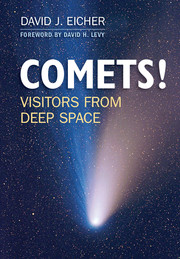Book contents
- Frontmatter
- Dedication
- Contents
- List of Figures
- List of Plates
- Foreword
- Preface
- Acknowledgments
- 1 Strange Lights in the Sky
- 2 Great Comets
- 3 What Are Comets?
- 4 Comets of the Modern Era
- 5 Comets in Human Culture
- 6 Where Comets Live
- 7 The Expanding Science of Comets
- 8 Observing Comets
- 9 Imaging Comets
- Glossary
- Bibliography
- Index
- Plate Section
5 - Comets in Human Culture
Published online by Cambridge University Press: 05 October 2013
- Frontmatter
- Dedication
- Contents
- List of Figures
- List of Plates
- Foreword
- Preface
- Acknowledgments
- 1 Strange Lights in the Sky
- 2 Great Comets
- 3 What Are Comets?
- 4 Comets of the Modern Era
- 5 Comets in Human Culture
- 6 Where Comets Live
- 7 The Expanding Science of Comets
- 8 Observing Comets
- 9 Imaging Comets
- Glossary
- Bibliography
- Index
- Plate Section
Summary
Comets have always been afforded a special place in the minds of human beings. In fact, from the earliest days of recorded history up through the 17th century, most people thought they were harbingers of doom or portents or some incredibly important events – perhaps good but usually bad. Thought to be specters from beyond, ghosts sent from heaven or hell and carrying wickedness or good, comets spent the entire history of human culture being misunderstood until just the last 300 years. And the real understanding of comets, as we’ve seen, has only developed over the past century. It’s difficult to blame the ancients for singling out comets, as so few things in the sky seem to change over short time intervals. To most, the sky, filled with stars, seems essentially static. Even the motions of the planets, the Moon, and the Sun are comfortable. But comets were outside the realm of the comfortable, and their uninvited, sudden appearances would shake the foundations of belief.
The Roman philosopher Lucius Annaeus Seneca, aka Seneca the Younger (ca. 4 b.c.–a.d. 65), summarized the early take on comets – as opposed to the always-visible parts of the heavens, the Sun, Moon, and so on – in one of his writings. “No man is so utterly dull and obtuse,” he penned,
with head so bent on Earth, as never to lift himself up and rise with all his soul to the contemplation of the starry heavens, especially when some fresh wonder shows a beacon-light in the sky. As long as the ordinary course of heaven runs on, custom robs it of its real size. Such is our constitution that objects of daily occurrence pass us unnoticed even when most worthy of our admiration. On the other hand, the sight even of trifling things is attractive if their appearance is unusual. So this concourse of stars, which paints with beauty the spacious firmament on high, gathers no concourse of the nation. But when there is any change in the wonted order, then all eyes are turned to the sky. … So natural is it to admire what is strange rather than what is great.
- Type
- Chapter
- Information
- COMETS!Visitors from Deep Space, pp. 94 - 116Publisher: Cambridge University PressPrint publication year: 2013



